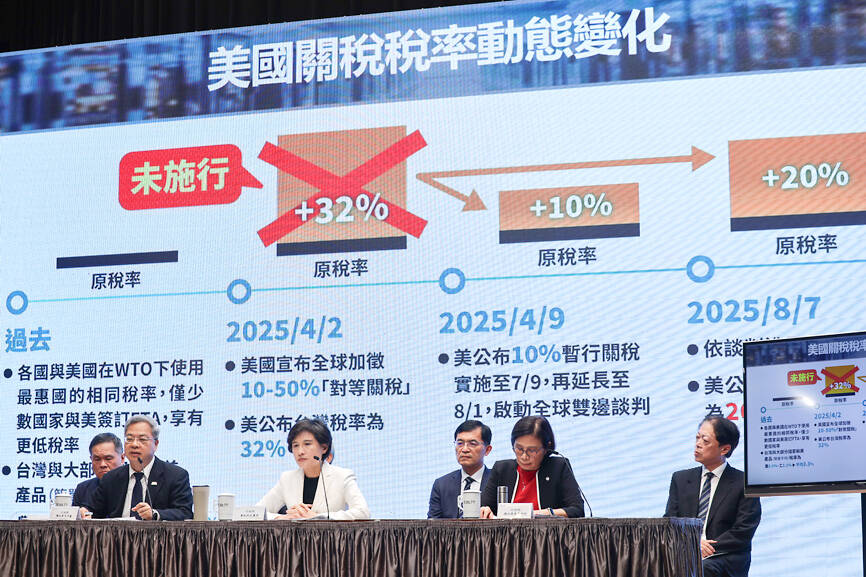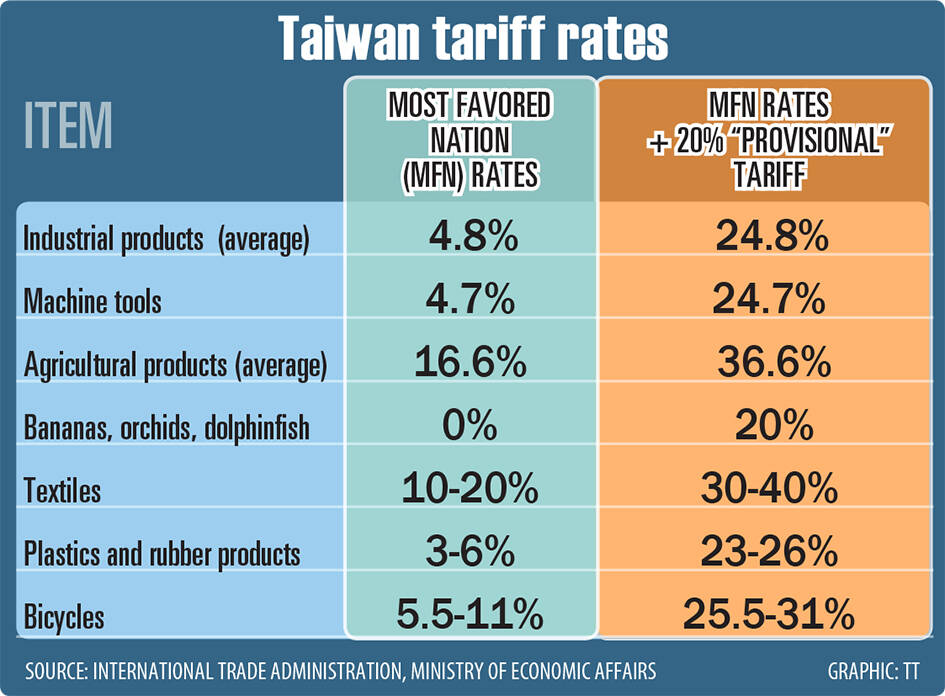Taiwan would strive for a better US tariff rate in negotiations, with the goal being not just lowering the current 20-percent tariff rate, but also securing an exemption from tariff stacking, Vice Premier Cheng Li-chiun (鄭麗君) said yesterday.
Cheng made the remarks at a news conference at the Executive Yuan explaining the new US tariffs and the government’s plans for supporting affected industries.
US President Donald Trump on July 31 announced a new tariff rate of 20 percent on Taiwan’s exports to the US starting on Thursday last week, and the Office of Trade Negotiations on Friday confirmed that it would be stacked on top of existing levies.

Photo: CNA
Cheng, who led Taiwan’s delegation to Washington for four rounds of trade negotiations with US officials, said Taiwan is still in trade talks with the US, including two videoconferences held on Thursday and Friday last week.
Taiwan and the US have held four in-person talks, in which both sides agreed there was continuous development, she said, adding that although an agreement was not reached before Thursday last week, lowering the tariff from the previously announced 32 percent to 20 percent is still progress.
Taiwan is also among the trading partners listed in an annex of the US president’s executive order issued on July 31, she added.

Taiwan hopes to hold further trade talks as soon as possible, as industries face the impacts and pressure from the new tariff, Cheng said, adding that the nation has the sixth-largest trade deficit with the US, with semiconductors making up 90 percent of that.
The opposition parties have accused the government of not telling the public that the tariff would be stacked on top of existing levies earlier, calling it “underhand dealings.”
Cheng said details of an agreement would not be publicized before negotiations are finished, adding that a nondisclosure agreement was also presented at the legislature’s confidential meeting last week.
The Cabinet is willing to report to the Legislative Yuan on the latest trade talk progress and the final agreement once it has been reached with the US, as well as a comprehensive impact assessment, she said.
The agreement text would also be delivered to the legislature for review, and explained openly and transparently, so there are no “underhanded dealings,” she said.
The recent trade talks with the US have been unconventional for all countries, as Washington had to hold talks with so many trading partners in only a few months, so the schedule was highly compressed, she said.
Taiwan has held more than 300 meetings since February in preparation for the trade talks with the US, she said.
There were new changes every time the delegation headed to Washington for talks, as the US delegation’s expectations, agendas and demands would gradually expand, so every country was faced with the challenges of opening their markets, Cheng said.
The US releases their trade policy agenda and trade report every year, so allowing the importation of vehicles and agricultural products is a challenge Taiwan always faces and included in the talks, she said.
Taiwan’s trade delegation engages in talks based on the principles of protecting national industrial interests and people’s health, she said.

The combined effect of the monsoon, the outer rim of Typhoon Fengshen and a low-pressure system is expected to bring significant rainfall this week to various parts of the nation, the Central Weather Administration (CWA) said. The heaviest rain is expected to occur today and tomorrow, with torrential rain expected in Keelung’s north coast, Yilan and the mountainous regions of Taipei and New Taipei City, the CWA said. Rivers could rise rapidly, and residents should stay away from riverbanks and avoid going to the mountains or engaging in water activities, it said. Scattered showers are expected today in central and

COOPERATION: Taiwan is aligning closely with US strategic objectives on various matters, including China’s rare earths restrictions, the Ministry of Foreign Affairs said Taiwan could deal with China’s tightened export controls on rare earth metals by turning to “urban mining,” a researcher said yesterday. Rare earth metals, which are used in semiconductors and other electronic components, could be recovered from industrial or electronic waste to reduce reliance on imports, National Cheng Kung University Department of Resources Engineering professor Lee Cheng-han (李政翰) said. Despite their name, rare earth elements are not actually rare — their abundance in the Earth’s crust is relatively high, but they are dispersed, making extraction and refining energy-intensive and environmentally damaging, he said, adding that many countries have opted to

FORCED LABOR: A US court listed three Taiwanese and nine firms based in Taiwan in its indictment, with eight of the companies registered at the same address Nine companies registered in Taiwan, as well as three Taiwanese, on Tuesday were named by the US Department of the Treasury’s Office of Foreign Assets Control (OFAC) as Specially Designated Nationals (SDNs) as a result of a US federal court indictment. The indictment unsealed at the federal court in Brooklyn, New York, said that Chen Zhi (陳志), a dual Cambodian-British national, is being indicted for fraud conspiracy, money laundering and overseeing Prince Holding Group’s forced-labor scam camps in Cambodia. At its peak, the company allegedly made US$30 million per day, court documents showed. The US government has seized Chen’s noncustodial wallet, which contains

SUPPLY CHAIN: Taiwan’s advantages in the drone industry include rapid production capacity that is independent of Chinese-made parts, the economic ministry said The Executive Yuan yesterday approved plans to invest NT$44.2 billion (US$1.44 billion) into domestic production of uncrewed aerial vehicles over the next six years, bringing Taiwan’s output value to more than NT$40 billion by 2030 and making the nation Asia’s democratic hub for the drone supply chain. The proposed budget has NT$33.8 billion in new allocations and NT$10.43 billion in existing funds, the Ministry of Economic Affairs said. Under the new development program, the public sector would purchase nearly 100,000 drones, of which 50,898 would be for civil and government use, while 48,750 would be for national defense, it said. The Ministry of